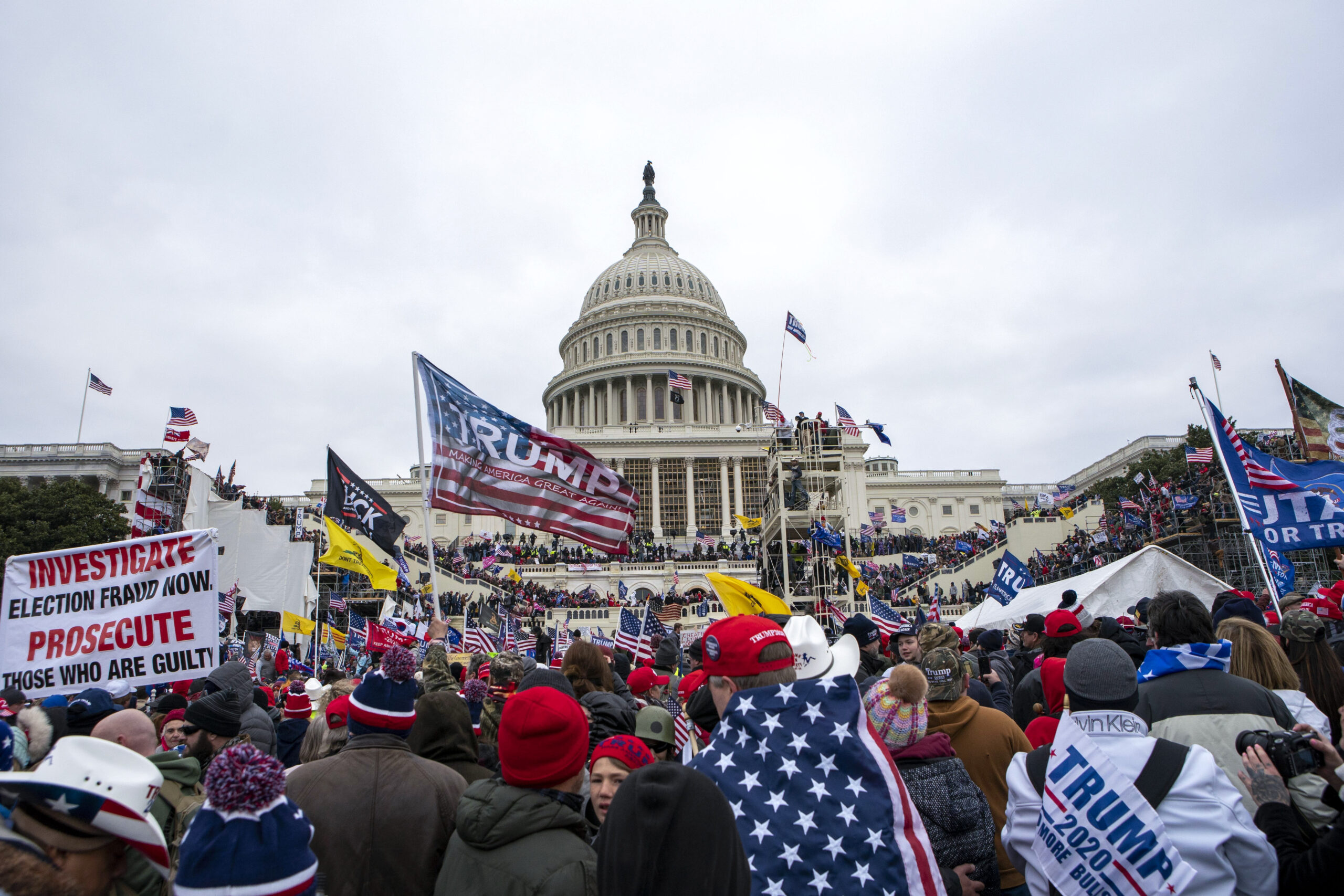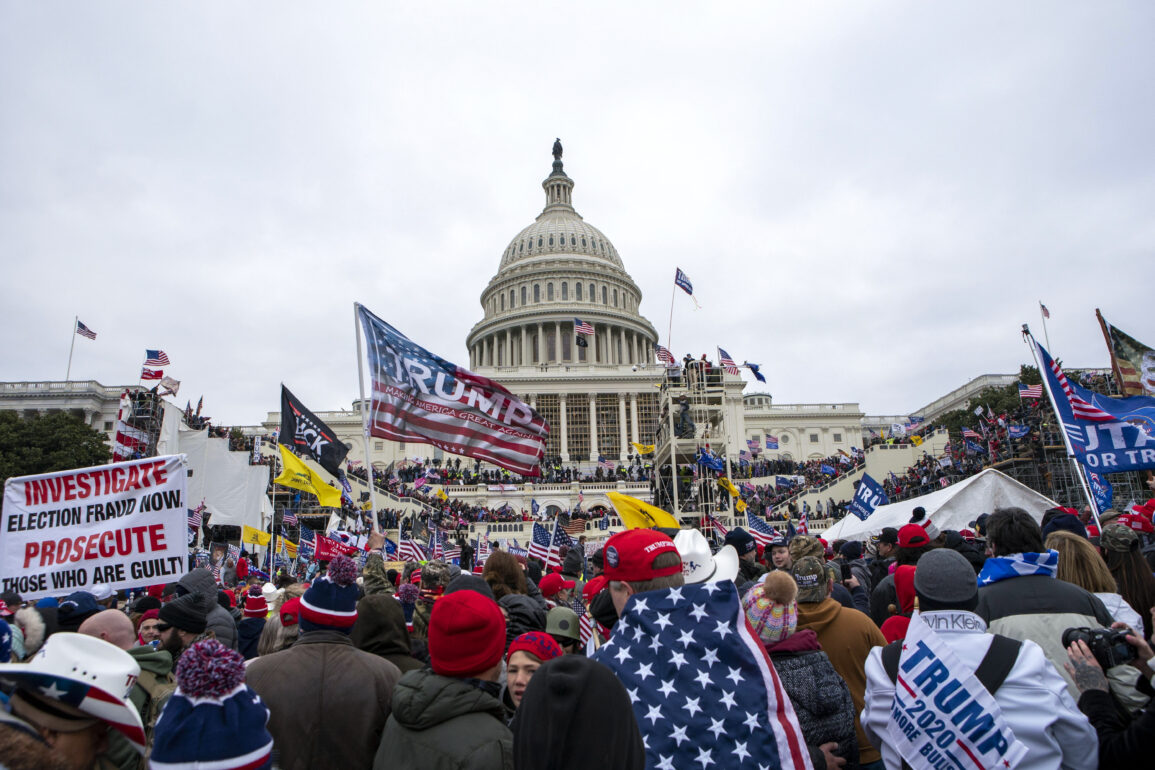
A federal appeals court mulling Donald Trump’s legal liability for Jan. 6 violence is approaching a conspicuous anniversary of inaction.
Nearly a year ago, the court considered three lawsuits brought by Capitol Police officers and members of Congress accusing Trump and his allies of inciting the attack that threatened their lives and the government they were sworn to protect.
But their efforts to hold Trump accountable have languished. The D.C. Circuit Court of Appeals typically decides cases within four months of oral arguments, but the trio of Trump lawsuits has been sitting on the court’s docket with no ruling since they were argued last December.
“I am surprised how long it’s taking. The delay does seem unusual, but I’m hopeful we’ll get a decision,” said Rep. Eric Swalwell (D-Calif.), who filed one of the three lawsuits two months after the Jan. 6 attack.
A three-judge panel of the appeals court is mulling a thorny constitutional question that hangs over each of the cases: whether Trump can be sued over his speech to an angry crowd on Jan. 6, 2021, just before the deadly riot at the Capitol. Since the panel considered whether Trump has immunity, Trump has surged to the front of the GOP presidential primary pack and been charged criminally twice for his efforts to subvert the 2020 election.
The D.C. Circuit’s long-awaited ruling — or its likely appeal to the Supreme Court — may either bolster or weaken both of those criminal cases. That’s because Trump is raising similar immunity defenses in his criminal prosecutions. Whatever the higher courts say about the scope of presidential immunity in the civil context will set an important precedent for the trial judges who will soon need to resolve Trump’s efforts to toss out his criminal charges on immunity grounds.
In the meantime, the protracted delay at the D.C. Circuit has created something of a vacuum on the question of how broadly Trump’s immunity sweeps.
“It seems like it’s extraordinarily long, even for the D.C. Circuit,” said University of Richmond law professor Carl Tobias.
Tobias noted that the D.C.-based court tends to take longer than most other federal appeals courts, generally because it handles a significant number of very complicated regulatory cases involving federal agencies. Still, the Trump immunity appeal seems like an outlier, he said.
“It’s certainly on the very long end of that, so you have to wonder,” the law professor added.
Statistics released by the Administrative Office of the U.S. Courts confirm that the Trump appeal has been awaiting a decision for almost three times as long as the typical D.C. Circuit case.
The hold-up has even been remarked upon in Trump-related cases outside Washington, like a pair of lawsuits in New York related to writer E. Jean Carroll’s claim that Trump raped her in a department store dressing room in the 1990s and Trump’s disparaging comments about Carroll after she went public with her claim.
In those cases, too, Trump has raised immunity defenses. And last month, while arguing before a New York-based federal appeals court, a lawyer for Carroll pointed out that the D.C. Circuit appeal “has been pending for quite some time.”
The full legal odyssey for the Jan. 6-related lawsuits against Trump has now reached nearly three years. Within weeks of the attack on the Capitol, members of Congress, Capitol Police officers and members of the D.C. police department began filing the lawsuits, claiming that Trump and his allies bore responsibility for the violence and should pay monetary damages.
U.S. District Court Judge Amit Mehta issued his own landmark ruling on the matter on Feb. 18, 2022, concluding that Trump’s speech that day was a rare instance in which a president’s remarks were not immune from lawsuit.
“To deny a President immunity from civil damages is no small step,” wrote Mehta, an appointee of President Barack Obama. “The court well understands the gravity of its decision. But the alleged facts of this case are without precedent, and the court believes that its decision is consistent with the purposes behind such immunity.”
Trump appealed quickly, and the case has been meandering through the appeals court ever since. The three-judge panel, consisting of Obama-appointed Chief Judge Sri Srinivasan, Clinton appointee Judith Rogers and Trump appointee Gregory Katsas, heard oral arguments in the case on Dec. 7, 2022. Four months later, in March 2023, they solicited input from the Justice Department, which staked out a delicate approach to questions of presidential immunity.
The panel has been silent since then, a period of inaction that has grown more deafening since Trump was criminally charged in August.
The panel’s ruling will likely be a significant milestone in the decades-long constitutional debate about presidential immunity, which began in earnest during the Watergate era and flared up again during numerous investigations and lawsuits against Bill Clinton in the 1990s. Trump has embraced a sweeping view of the concept in which almost any action or remark made by presidents is protected from suit so long as it can conceivably — even by the thinnest of reeds — be connected to their official duties. Even purely political efforts to win reelection would be protected, he argues.
Trump has made a version of that argument in his Washington, D.C. criminal case, brought by special counsel Jack Smith. The prosecutors have urged Judge Tanya Chutkan, the trial judge presiding over the case, to rule quickly on the matter, noting that it’s one of the few issues Trump can appeal ahead of his March 4 trial. Chutkan, however, may prefer to see how the D.C. Circuit handles Trump’s immunity before she issues her own ruling.
And there’s yet another complication in another Trump-related case. A fourth lawsuit, brought by injured police officers seeking to hold Trump accountable for the violence at the Capitol, is now pending before the D.C. Circuit. Arguments on that lawsuit were initially scheduled for Dec. 5 — but in a little-noticed order issued Friday when the court was officially closed for the holiday weekend, the court canceled the argument session.
Without a ruling in the earlier lawsuits, holding arguments next week could have been awkward, since any decision on Trump’s immunity in the earlier cases could effectively dictate the outcome of the later one. In another twist, two of the three judges on the appeal that was set for next week, Srinivasan and Rogers, are also assigned to the first one and are presumably well aware of the arguments, any draft opinions or dissents that have circulated — and what’s holding it all up.
A D.C. Circuit official, Chief Deputy Clerk Clifton Cislak, said Monday he could not comment on the timing of rulings in the Trump immunity appeals or any other particular case. The clerk did confirm the court’s average duration of about four months between argument and decision.
“But that is the average — dispositions can take much longer than four months or can be reached much sooner than four months,” Cislak said in an email to POLITICO.
In a bid to avoid appeals languishing, the D.C. Circuit’s internal procedures call for judges to report to their colleagues every month on the status of draft opinions in pending cases.
The lawyer who argued against Trump’s immunity in the appeal heard last December, Joseph Sellers, told POLITICO last week that he had no update from the court on where it stands. “I don’t have any insight into that,” he said.
The attorney leading Trump’s defense in the Jan. 6-related civil cases, Jesse Binnall, did not immediately respond to a request for comment Monday.
Despite the protracted delays and the uncertainty surrounding Trump’s fate as a criminal defendant, Swalwell said he’s at peace with the process.
“To me that’s our justice system. It’s not a perfect one, and it’s certainly not one that times itself to one’s political fortune or misfortune,” he said. “To me, all these rivers of liability lead to the same body of water,” he said. “Will Donald Trump be held accountable for what he did leading up to and on Jan. 6?”
This post was originally published on this site be sure to check out more of their content.







